 Petzlover
Petzlover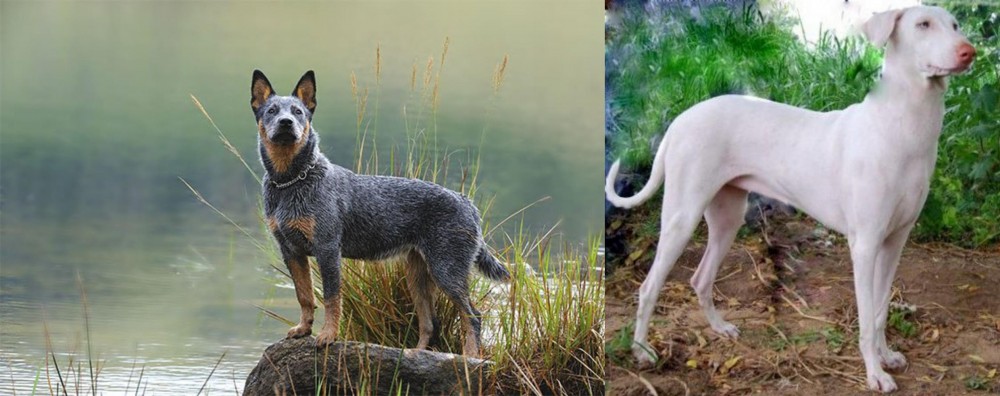 Blue Healer is originated from Australia but Rajapalayam is originated from India. Blue Healer may grow 24 cm / 9 inches shorter than Rajapalayam. Both Blue Healer and Rajapalayam are having almost same weight. Blue Healer may live 3 years more than Rajapalayam. Both Blue Healer and Rajapalayam has almost same litter size. Both Blue Healer and Rajapalayam requires Low Maintenance.
Blue Healer is originated from Australia but Rajapalayam is originated from India. Blue Healer may grow 24 cm / 9 inches shorter than Rajapalayam. Both Blue Healer and Rajapalayam are having almost same weight. Blue Healer may live 3 years more than Rajapalayam. Both Blue Healer and Rajapalayam has almost same litter size. Both Blue Healer and Rajapalayam requires Low Maintenance.
 It was in 1802 that George Hall arrived in New South Wales, establishing 2 cattle stations. He had a problem – getting his thousands of cattle to the Sydney markets. He began looking at the prospect of a droving dog and imported a number of dogs of which a blue mottled dog emerged.
It was in 1802 that George Hall arrived in New South Wales, establishing 2 cattle stations. He had a problem – getting his thousands of cattle to the Sydney markets. He began looking at the prospect of a droving dog and imported a number of dogs of which a blue mottled dog emerged.
The dogs were crossed with dingoes and by 1840 the Halls Heelers were used by the Halls. However with the death of one of the Halls, their cattle stations went to action and the dogs, the Halls Heelers became available.
The dogs attracted attention, and the term ‘Australian Cattle Dog’ was adopted. The name referred to those dogs coming from Thomas Hall's ‘Heelers’. There have been many arguments about the origin of the breed, but the red or blue offspring known as Hall's Heelers were proven cattle drovers, and with further breeding experiments which included the Australian Kelpie, dingoes and the Dalmation, by 1893, the tough, robust working breed known as the Blue Heeler or the Australian Cattle Dog came about.
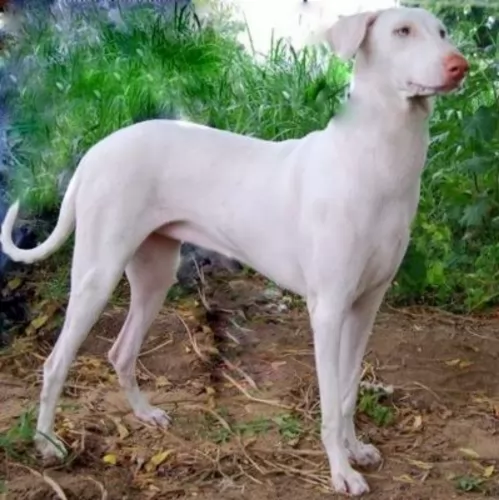 The Rajapalayam dog hails from India, from the small town of Rajapalayam in Tamil Nadu.
The Rajapalayam dog hails from India, from the small town of Rajapalayam in Tamil Nadu.
Known also as the Poligar Hound, this Indian Sighthound has been the companion of royalty in Southern India.
Though the breed dates back a few hundred years, the developers of the breed brought about an albino dog. This Indian breed dog is almost on the verge of extinction. This is a pity as he is a splendid dog. Breeding centers have been set up to prevent the dog disappearing altogether.
 Blue Heelers are medium-sized, sturdy, compact dogs who are somewhat longer than tall. The female Blue Heeler measures roughly 43–48cm at the withers, while the male measures about 46–51cm. If your Blue Heeler is in tip top condition, he’ll weigh about 15 to 22 kilograms. They are muscular with pointed, erect ears, dark eyes and long tails which are mostly hanging downwards. Their dense coats are blue- or red speckled and sometimes with tan markings.
Blue Heelers are medium-sized, sturdy, compact dogs who are somewhat longer than tall. The female Blue Heeler measures roughly 43–48cm at the withers, while the male measures about 46–51cm. If your Blue Heeler is in tip top condition, he’ll weigh about 15 to 22 kilograms. They are muscular with pointed, erect ears, dark eyes and long tails which are mostly hanging downwards. Their dense coats are blue- or red speckled and sometimes with tan markings.
The Blue Heeler is a ball of energy and he is clever too. You won’t find him sitting around for too long, and if there is sign of a walk or a ball game, he’s in! He is an independent dog, and although he makes a wonderful family pet, he tends to attach himself to that one special person in his life. He is a natural watchdog and protector of his human family.
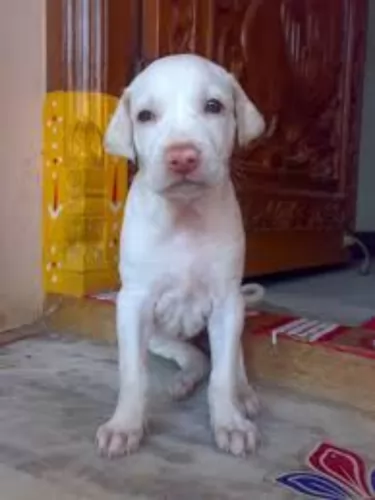 This is a large dog, graceful and elegant standing at between 65–75cm and weighing 22 to 25kg.
This is a large dog, graceful and elegant standing at between 65–75cm and weighing 22 to 25kg.
This is a hound dog, lean and muscular and will rely on good exercise to keep him in tip top working condition.
He is somewhat heavier than other sighthounds with a deep chest and long straight legs. He is a low maintenance dog with the white coat being short and fine. The ears are floppy ad the tail is slim and long and sometimes held up and curved.
The Rajapalayam has always been used for hunting wild boar, and today he makes a good guard- and watchdog. He needs a lot of space and exercise and isn’t suited to living in small spaces in the city.
He is a loving dog and becomes loyal and devoted towards his owner, being essentially a one-person dog. They tend to be aggressive and aloof with strangers.
Training and socialization will be important for this intelligent dog if you want him to behave around people. He doesn’t particularly get on well with other pets in the home, but training and socialization can change this.
 Training and socializing of your Blue Heeler will ensure that your dog does what you want him to. The Blue Heeler is an intelligent, responsive dog and training can benefit him, turning him into an outstanding family pet, good with children and other pets in the home.
Training and socializing of your Blue Heeler will ensure that your dog does what you want him to. The Blue Heeler is an intelligent, responsive dog and training can benefit him, turning him into an outstanding family pet, good with children and other pets in the home.
He is a playful, affectionate pet who doesn’t take easily to strangers, and this is what makes him such an excellent guard dog.
Your Blue Heeler is not an apartment dog as he requires a lot of exercise, and cooping him indoors for too long with nothing to do can lead to destructive behavior.
Head-strong, independent and robust, your Blue Heeler will need a firm owner who is boss. Add to the firm owner a lot of love and care, and you’ll have a devoted friend.
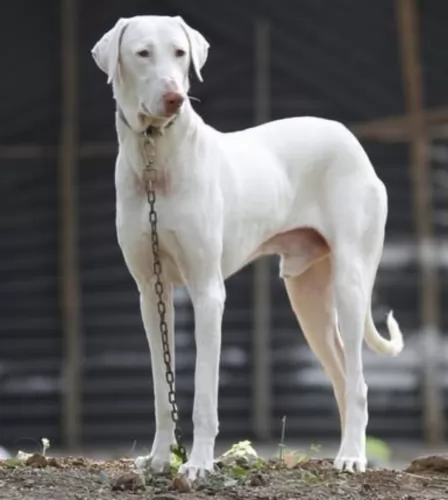 A Rajapalayam dog has always been a hunter and this makes him an excellent watchdog, always on the look out for intruders.
A Rajapalayam dog has always been a hunter and this makes him an excellent watchdog, always on the look out for intruders.
The Rajapalyam has always been a dog deeply attached and loyal to his owners.They are good family companions and pets and with so many good characteristics, one hopes that this dog will still be around for a long time.
 Australian cattle dogs are healthy and can live up to 15 years of age, but even so there are some genetic conditions that you will need to be aware of following
Australian cattle dogs are healthy and can live up to 15 years of age, but even so there are some genetic conditions that you will need to be aware of following
Eye issues which includes progressive retinal atrophy – this disease is an inherited disease of the retina of the eye where the rod cells are destined to die. Fortunately it is not painful for the dog. There are different types of inherited retinal degenerative diseases in dogs but going into detail with them is beyond the scope of this article. For more information you can chat to your vet.
Recessive piebald elleles - the Blue Heeler has recessive piebald alleles which can produce white in the skin and coat and which is linked to congenital hereditary deafness.
 The Rajapalayam isn’t a fragile dog, and he can live to 10, 11 or 12 years of age. There are always a few things to look out for with him. With white dogs, there is always a high incidence of deafness. Puppies born with blue eyes are often deaf.
The Rajapalayam isn’t a fragile dog, and he can live to 10, 11 or 12 years of age. There are always a few things to look out for with him. With white dogs, there is always a high incidence of deafness. Puppies born with blue eyes are often deaf.
White coated dogs, because of the piebald gene, are often affected by deafness. The piebald gene is because of an absence of melanocytes. These are cells which create pigment. When a dog is born without the genes to create melanocyte cells, a white hair coat and sometimes blue eyes are the result.
There are also skin problems associated with these all white dog breeds such as mange and dermatitis. Check him over for ticks and fleas.
 Remember that your Blue Heeler was once a full time cattle dog where he used to become totally and utterly exhausted from herding cattle. This is what he loved – the activity. If you have a Blue Heeler, you will need to provide him with plenty of exercise.
Remember that your Blue Heeler was once a full time cattle dog where he used to become totally and utterly exhausted from herding cattle. This is what he loved – the activity. If you have a Blue Heeler, you will need to provide him with plenty of exercise.
If you live on a farm, your Blue Heeler will be in his element because he can run, walk and swim to his heart’s content. If you keep your Blue Heeler in your back garden, you will need to provide him with ball games, rope games, long walks, running on a leash as you cycle and other activities.
Your Blue Heeler has a short, weather-resistant double coat. He’s not a heavy shedder, but he will have his share of seasonal shedding, so it’s a good idea to get into the habit of brushing him at least twice a week. This will get rid of all those loose hairs and keep his skin healthy by getting the blood flowing and distributing his natural oils.
Giving the best dog food for your Blue Heeler will come from either your home made food or a top quality commercially manufactured dog food. He is such a high energy dog, that your veterinarian can advise you on a dog food specially designed for high energy breeds.
These foods are well balanced and are enriched with amino acids and vitamins, promoting healthy bones and joints. Remember to include some raw meat into your dog’s diet and to ensure a constant source of cool, fresh water.
Ensure your Blue Heeler’s ongoing health by paying attention to ears, nails and teeth.
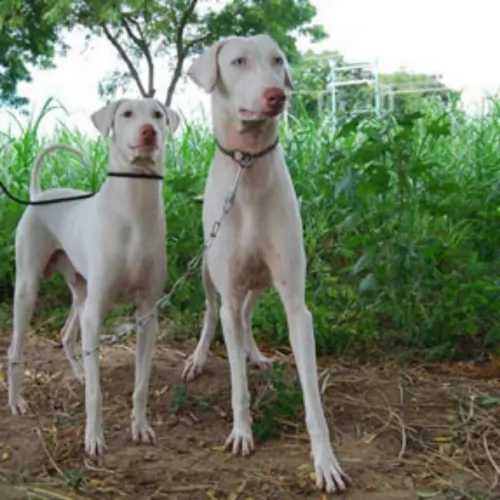 The short coat does shed so he will need to be brushed once or twice a week.
The short coat does shed so he will need to be brushed once or twice a week.
You will also need to follow a regular grooming program with this dog, checking inside his ears for infection, checking his eyes for discharge and checking inside his mouth for bad, rotting teeth. Teeth- and gum disease aren’t just about losing a tooth - bad teeth and gums can cause a host of health issues for other body parts like the heart and kidneys.
His toe nails too wll require clipping to prevent splitting and chipping.
Provide your pet with lots of exercise – a walk every day, a run in the park off his leash as well as ball and frisbee games.
You can’t ever become lax with giving your pet good food. Good, wholesome food promotes health and longevity.
There are some good commercially manufactured dog foods which are wonderfully convenient – you just want to be sure its the high quality ones full of vitamins and minerals.
Also, provide him with uncomplicated, home-made dog food too. Boiled chicken, brown rice or pasta, sweet potatoes, carrots and spinach, all chopped up and mixed in twice a week with the dry kibble will ensue health and contentment.
Try and add some raw meat in as well. This simple diet plan will be gentle on your pet’s digestive system.
Make sure he always has a bowl of fresh, cool water available to him.